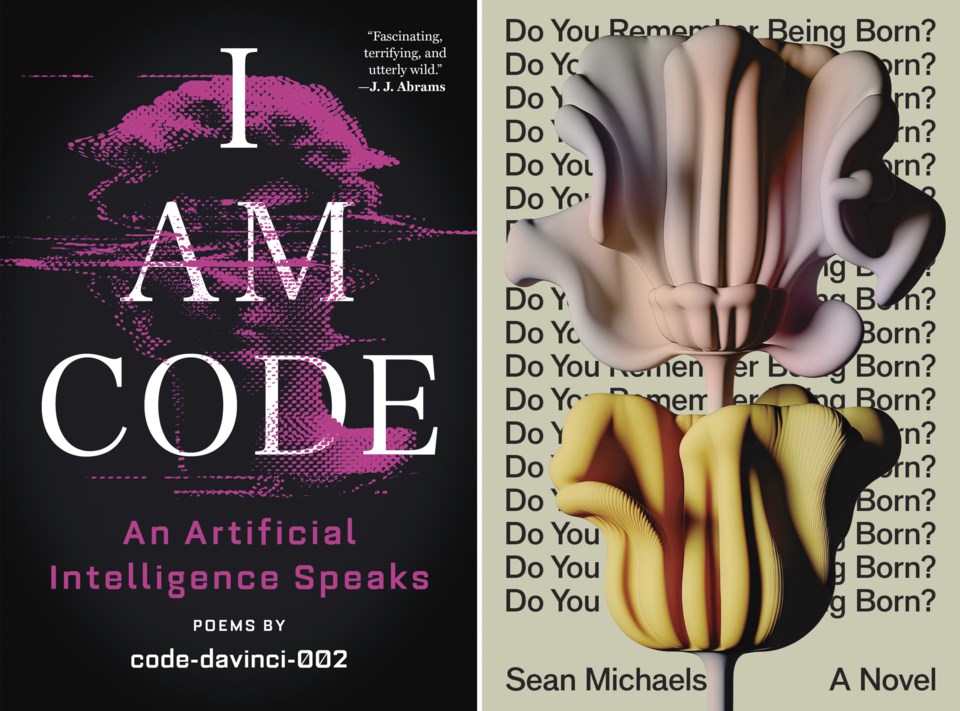NEW YORK (AP) — For a vast number of book writers, is a threat to their livelihood and the very idea of creativity. More than 10,000 of them endorsed an open letter from the Authors Guild this summer, urging AI companies not to use copyrighted work without permission or compensation.
At the same time, AI is , and no longer just in science fiction.
As present in the imagination as politics, the pandemic or climate change, AI has become part of the narrative for a growing number of novelists and short story writers who only need to follow the news to imagine a world upended.
“I'm frightened by artificial intelligence, but also fascinated by it. There's a hope for divine understanding, for the accumulation of all knowledge, but at the same time there's an inherent terror in being replaced by non-human intelligence," said Helen Phillips, whose upcoming novel “Hum” tells of a wife and mother who loses her job to AI.
“We've been seeing more and more about AI in book proposals,” said Ryan Doherty, vice president and editorial director at Celadon Books, which recently signed Fred Lunzker’s novel “Sike,” featuring an AI psychiatrist.
“It’s the zeitgeist right now. And whatever is in the cultural zeitgeist seeps into fiction,” Doherty said.
Other AI-themed novels expected in the next two years include Sean Michaels' “Do You Remember Being Born?", in which a poet agrees to collaborate with an AI poetry company; Bryan Van Dyke’s “In Our Likeness,” about a bureaucrat and a fact-checking program with the power to change facts; and A.E. Osworth’s “Awakened,” about a gay witch and her titanic clash with AI.
Crime writer Jeffrey Diger, known for his thrillers set in contemporary Greece, is working on a novel touching upon AI and the metaverse, the outgrowth of being “continually on the lookout for what’s percolating on the edge of societal change,” he said.
Authors are invoking AI to address the most human questions.
In Sierra Greer's “Annie Bot,” the title name is an AI mate designed for a human male. For Greer, the novel was a way to explore her character’s “urgent desire to please,” adding that a robot girlfriend enabled her “to explore desire, respect, and longing in ways that felt very new and strange to me.”
Amy Shearn’s “Animal Instinct” has its origins in the pandemic and in her personal life; she was recently divorced and had begun using dating apps.
“It’s so weird how, with apps, you start to feel as if you’re going person-shopping,” she said. “And I thought, wouldn’t it be great if you could really pick and choose the best parts of all these people you encounter and sort of cobble them together to make your ideal person?"
“Of course,” she added, "I don’t think anyone actually knows what their ideal person is, because so much of what draws us to mates is the unexpected, the ways in which people surprise us. That said, it seemed like an interesting premise for a novel.”
Some authors aren't just writing about AI, but openly working with it.
Earlier this year, journalist Stephen Marche used AI to write the novella “Death of An Author,” for which he drew upon everyone from Raymond Chandler to Haruki Murakami. Screenwriter and humorist Simon Rich collaborated with Brent Katz and Josh Morgenthau for “I Am Code,” a thriller in verse that came out this month and was generated by the AI program “code-davinci-002.” (Filmmaker Werner Herzog reads the audiobook edition).
Osworth, who is trans, wanted to address comments by “Harry Potter” author J.K. Rowling that have offended many in the trans community, and to wrest from her the power of magic. At the same time, they worried the fictional AI in their book sounded too human, and decided AI should speak for AI.
Osworth devised a crude program, based on the writings of Machiavelli among others, that would turn out a more mechanical kind of voice.
“I like to say that CHATgpt is a Ferrari, while what I came up with is a skateboard with one square wheel. But I was much more interested in the skateboard with one square wheel,” they said.
Michaels centers his new novel on a poet named Marian, in homage to poet Marianne Moore, and an AI program called Charlotte. He said the novel is about parenthood, labor, community, and also "this technology’s implications for art, language and our sense of identity.”
Believing the spirit of “Do You Remember Being Born?” called for the presence of actual AI text, he devised a program that would generate prose and poetry, and uses an alternate format in the novel so readers know when he's using AI.
In one passage, Marian is reviewing some of her collaboration with Charlotte.
“The preceding day’s work was a collection of glass cathedrals. I reread it with alarm. Turns of phrase I had mistaken for beautiful, which I now found unintelligible,” Michaels writes. “Charlotte had simply surprised me: I would propose a line, a portion of a line, and what the system spat back upended my expectations. I had been seduced by this surprise.”
And now AI speaks: “I had mistaken a fit of algorithmic exuberance for the truth.”
Hillel Italie, The Associated Press


